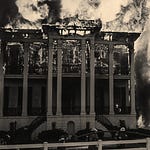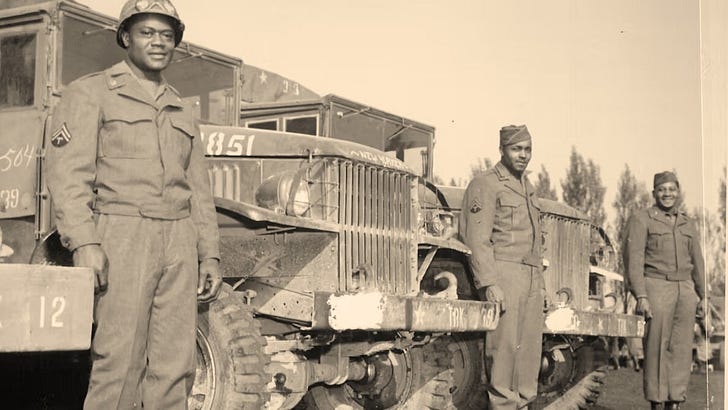Before my Live Stream, I received an interesting question from Ernest Crim III another Black history content creator who's much larger than I am. He asked:
"What books have inspired you the most, and which historical figures have influenced you the most?"
That's a really great question.
One of the books that has deeply inspired me is "The Souls of Black Folk" by W.E.B. Du Bois. Du Bois was one of the first prominent black scholars to examine and articulate the black experience through a distinctly intellectual lens. His analysis of race and racism opened up discussions about black identity in ways that hadn’t really existed before.
"The Souls of Black Folk" is essentially a collection of essays that Du Bois compiled into one book. One of the most important concepts he introduced is called Double Consciousness. Du Bois described Double Consciousness as the internal conflict African Americans experience—how we personally see ourselves versus how we’re perceived in a white-dominated society. Du Bois explained it beautifully in this passage:
"It is a particular sensation, this double-consciousness, this sense of always looking at one’s self through the eyes of others."
Today, this concept continues to be relevant—our identity is often shaped through the gap between how we perceive ourselves and how white society perceives us. It influences many aspects of our daily lives, from media portrayal and education to politics and even how we produce content. For example, there's always a sense of caution, a self-consciousness about speaking or acting a certain way in "mixed company" to avoid perpetuating negative perceptions or stereotypes. This notion has greatly impacted me personally, and it's one of the reasons "The Souls of Black Folk" remains so important to me.
There's another reason I love W.E.B. Du Bois: he was unapologetically spicy and incredibly petty. Even in this book, he saved his boldest critiques for the final chapters, especially his commentary on Booker T. Washington's leadership. At that time, Booker T. Washington was widely accepted as the public and political face of Black America, especially following Frederick Douglass' death.
Du Bois directly opposed Washington’s stance on racial progress. Washington was known for advocating vocational education and economic self-reliance for black people. While vocational education itself wasn’t inherently bad advice, Washington also advocated accommodating segregation temporarily, suggesting black people delay their push for civil rights and political power. In his famous 1895 Atlanta Compromise Speech, Washington urged black Americans to "cast down your bucket where you are," and focus on becoming skilled workers and farmers rather than pursuing political equality.
Du Bois strongly disagreed, arguing that Washington’s mindset was too submissive and shortsighted. In his view, simply accepting segregation would never lead to true equality or progress. Du Bois insisted black people needed more than vocational training—they required higher education and intellectual leaders who could challenge white supremacy directly. Political equality and access to voting rights, excellent schools, and legal protection were non-negotiable demands.
In the book, Du Bois described Booker T. Washington's approach this way:
"Mr. Washington represents, in Negro thought, the old attitude of adjustment and submission... it must needs make men narrow in order to give them force."
In other words, Du Bois acknowledged Washington's sincere efforts and achievements, but criticized that approach as outdated, overly compromising, and limiting.
It's important historical context to note they had two very different upbringings. Washington grew up enslaved and experienced firsthand the brutalities of slavery, shaping his views significantly. Du Bois, in contrast, grew up relatively middle-class in Massachusetts, leading him to have a very different perspective on race and racial progress.
Interestingly, Du Bois' criticisms of Booker T. Washington led to substantial historical impacts beyond their personal disagreements. Du Bois helped form an activist organization called the Niagara Movement, explicitly created to oppose Washington’s conservative, accommodationist strategy. While the Niagara Movement itself didn't last long, it evolved into the NAACP after a brutal race riot in the early 1900s convinced many activists of the need for an interracial body to advance black rights. Many original Niagara Movement members became prominent figures within the NAACP, with Du Bois himself taking on leadership roles and serving as the editor for the NAACP's influential publication, "The Crisis."
I personally find it both amazing and amusing that Du Bois' fierce determination and pettiness changed the trajectory of civil rights activism for the better.
Now, to answer the second part of Mr. Grim’s question, the historical figure who has particularly inspired me is Ida B. Wells.
Ida B. Wells was a powerful journalist and activist at the turn of the 20th century. At a time when the nation routinely ignored or justified lynching of black men, she took courageous steps to investigate the real motives and methods behind lynchings. Wells debunked the widespread myth that lynchings were justified punishments for crimes. Instead, she provided clear evidence that lynching functioned primarily as racial terror, designed specifically to intimidate and oppress the black community, especially when they achieved economic or social success.
Ida B. Wells documented lynchings extensively, offering detailed names, dates, and circumstances. Her investigations produced groundbreaking reports like "Southern Horrors" and "The Red Record," among the earliest examples of fact-based, data-driven journalism on racial violence.
Her activism came at great personal risk. For example, in Memphis, she published a newspaper called the Memphis Free Press. Some friends of hers were lynched because their successful grocery store economically threatened a nearby white business owner. After Wells wrote a fierce editorial challenging the lies that white men used to justify lynchings—particularly the false accusations against black men assaulting white women—her newspaper's offices were burned to the ground. She had written clearly (and courageously) that the true purposes behind lynching were racial hatred and economic jealousy rather than any genuine concern for the safety of white women. After threats on her life, she had little choice but to leave Memphis permanently.
Wells never returned to the South—wisely, as she almost certainly would have been lynched herself. But she continued advocating strongly against racial violence for the rest of her life, raising awareness across the nation and abroad. Her fearless journalism drives home the power of truth, especially today when it's still critically important.
In conclusion, to answer Mr. Grim's thoughtful questions:
The book that most deeply inspired me is "The Souls of Black Folk" by W.E.B. Du Bois, driven largely by its concept of Double Consciousness and Du Bois' unapologetic pettiness.
The historical figure I look up to most is Ida B. Wells, an extraordinary journalist and fearless advocate who exposed racial violence at a time when doing so risked her life and livelihood. She deserves far more recognition for her brave contributions to civil rights and racial justice.












Share this post